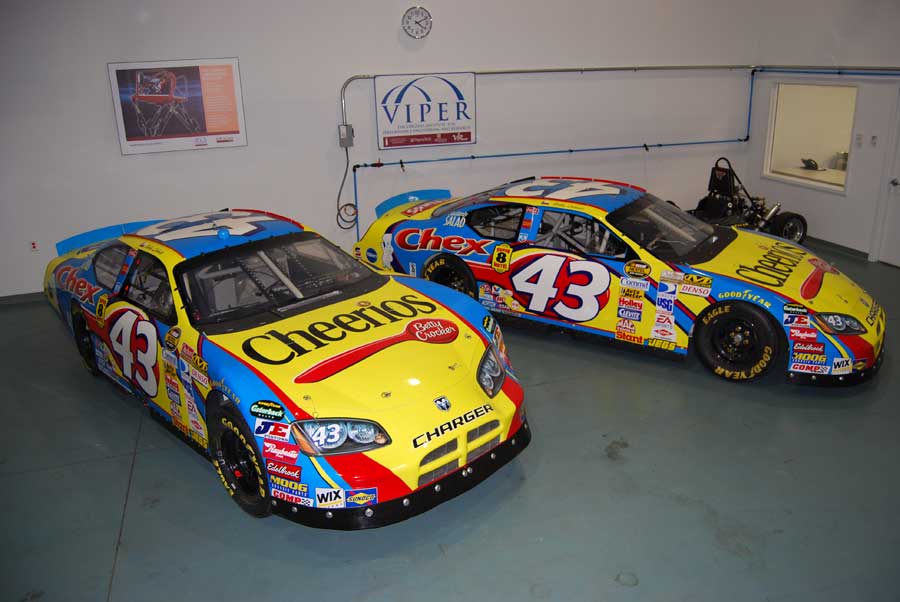Virginia Tech receives Petty Enterprises donation for motor sports research

Virginia Tech received a donation of two retired No. 43 Nextel Cup race cars from Petty Enterprises to use as research tools at the Virginia Institute for Performance Engineering and Research.
Richard Petty and son Kyle have donated the race cars to the foundation for use by mechanical engineering graduate students pursuing degrees at the premier motor sports research facility, the Virginia Institute for Performance Engineering and Research, commonly known as VIPER. The facility is located at Virginia International Raceway in Halifax County.
The VIPER is one of four mechanical engineering/motor sports-related research labs affiliated with the Institute for Advanced Learning and Research in Danville, an outreach effort of Virginia Tech in partnership with the local community.
Virginia Tech Foundation Chief Operating Officer Ray Smoot noted, “Petty Enterprises has been a great economic engine for the region for a long time. This donation to the Virginia Tech Foundation for the VIPER motor sports lab in Southside advances a research program that will further strengthen the area’s economic development. We are delighted.”
The Petty's decision was prompted by the Nextel Cup’s move to the “Car of Tomorrow” in 2008, necessitating the retirement of standard-model race cars following the final Ford 400 Nextel Cup Series race in November 2007. As a result, most of the cup cars were relegated to driver-development programs or were sold to Automobile Racing Club of America teams for pennies on the dollar. However, Petty Enterprises chose to donate some of their cars to engineering programs designed to produce future racing engineers.
Petty Enterprises General Manager Robbie Loomis noted in an ESPN.com article that the first donation would be to Virginia Tech for use at VIPER, primarily due to the research already underway there with a well-known motor sports team. Said Loomis, “In this sport we need an area where we can groom and shape engineers to really fit the racing model. There always seems to be a disconnect between the book engineer and the actual applications engineer at the racetrack. So we hope we can bring that together for the future."
VIPER Director Steve Southward couldn’t agree more. Said Southward, “We are thrilled to have the race cars in the lab for hands-on experience. Working with these cars on our eight-post shaker rig allows our students to put what they learned about chassis engineering in class into practice in a way that leads to real know-how.” The institute’s eight-post shaker rig, known as VIPER 8 post, tests vehicular suspension systems and is the only one of its kind in North America for commercial testing.
The VIPER program in mechanical engineering has attracted thirteen graduate students to its Southside location since the program began in fall 2005. There is also a graduate student connection between the institute and Petty Enterprises. Two former Virginia Tech mechanical engineering students have worked for Petty Enterprises in the past, according to Team Manager Jerry Freeze. Freeze said he hopes that Petty Enterprises, “will be able to benefit from more talent [from Virginia Tech] in the future.” Southward says he is counting on Petty and other racing teams to hire graduates from the program he and his colleagues are building in the region.
In addition to the VIPER 8 post, the institute offers cutting-edge test equipment including a shock dynamometer, and a driving simulator. The institute is uniquely positioned to provide the latest in vehicle performance engineering through technology advancements with its research partners: Virginia Tech, focusing on suspensions and drivers; Old Dominion University, focusing on aerodynamics and power train systems; and the Virginia International Raceway, a leading vehicle performance center.
For more information about VIPER, contact Steve Southward at (434) 766-6794.
This article was written by Deborah Morehead.




